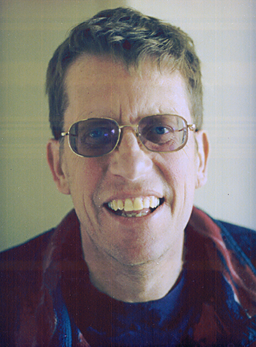 Eric Monke.
Eric Monke.
Eric invited me to come with him to the University of Arizona in 1980, when he accepted a position as assistant professor of agricultural economics. In addition to research in improving the lot of Third World farmers, he taught graduate students cost benefit analysis, which seems an appropriate model for telling this story.
Costs
In those days it made sense to move to the Southwest, both in housing costs and recreational opportunities. We ran 10Ks every weekend, got an Airedale named Ginger, went hiking and camping all over the map, had idyllic experiences where we encountered no one. We thought this would continue.
One day we found ourselves in Rome running toward the Castel Sant'Angelo, and Eric’s legs gave out. He received the diagnosis of multiple sclerosis (MS) in 1987. If you don’t know, this debilitating disease destroys the myelin sheath that coats the nerves in the body, and prohibits the brain from telling the limbs what to do. There is no cure. I then joined a club to which I never wanted to belong. I had to assume the majority of domestic chores as well as his custodial maintenance. When asked what I remember of those days, I reply: a lot of bewilderment and weeping. And also joy. See benefits below.
Eric lost the use of his body in a process of dying daily. Gradually we gave up camping, biking, hiking, sailing. It became difficult to travel and bathrooms were a nightmare. The sheer effort of moving him left me exhausted, and the emotional toll left me sleepless at night.
New challenges kept coming, like how do I convince him that he needs to: get a wheelchair? give up his driver’s license? accept paid help?
How do we respond to discrimination, and lots of it?
How do you navigate through cobblestones and dog poop with two small children?
And how could I face the guilt when I knew the answer to the question, “When will this end?”
Benefits
We got to see the world! Not just see it, but live it. We spent Fullbrights and summers in Portugal and Italy, pretty much following cool weather (see MS demyelination and heat tolerance) in Eric’s endeavor to improve the lot of farmers. He believed sustainable agriculture and poverty did not bestow nobility.
Our children became compassionate individuals. Dylan’s teachers reported that he had befriended the child no one else would talk to. Celeste poured herself into work with the intent to change the world. Both continue as products of us.
I know a lot about agriculture and can point with pride to Eric’s work in Liberia, Indonesia, Portugal Ukraine, Italy, the U.K., France, Switzerland, Belgium...more I can’t name. And especially Kenya.
Eric made more than 20 visits to Kenya, where his former students and colleagues continue to improve farmers' lives. We finally lived the dream we had talked about when the whole family visited the country in 2000. We in the U.S. have become accustomed to accessiblity in all aspects, especially thanks to the ADA. Elsewhere in the world, the disabled are for the most part invisible. We managed to go on safari and see a world of animals, magnificence no video or photograph can convey. At every stop I enlisted help to move Eric around. Every time I thanked my helpers, they gave me the same response: “Do not thank me. There but for the grace of God, go I.”
Post Mortem
The fact that my family lived through this makes me happy. I don’t say anymore that it’s OK to be sad. I celebrate birthdays and feel happy to get old and continue walking upright. I have learned to love again with another man who has wisely taught me that life is about helping people live, and helping them die.
I have an intimate understanding of caregiving and those who do it every day. It began the mystery of deciphering a chronic and fatal condition, and how to find a new definition of family. I am forever grateful and blessed by the circle of friends who still surround us today, and their willingness to come assist at my beckon at three in the morning, which happened almost daily. In the end, we are all caregivers, and count our blessings to be so.

By submitting your comments, you hereby give AZPM the right to post your comments and potentially use them in any other form of media operated by this institution.